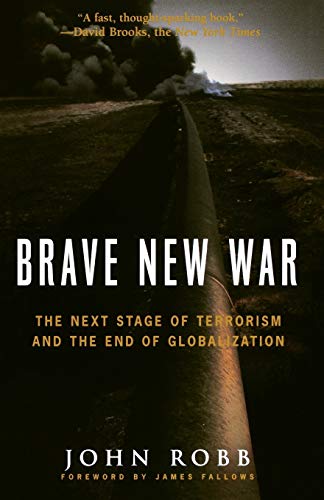Washington Examiner
May 23, 2007

James Joyner: Throughout the book, you point out how easy it would be for relatively small groups with minimal funding to create power blackouts, disrupt our oil distribution networks, or even stage 9/11-style attacks on a routine basis. Why do you suppose that hasn’t already happened? For that matter, we are surely more vulnerable than Jerusalem or Baghdad to suicide bombers, yet we have yet to see such attacks in our cities. Why?
John Robb: To understand this, you need to understand that classic symbolic terrorism is plagued by diminishing returns. The more you use it, the less of an effect it has. So, in order to match or exceed previous impacts, you need to increase the scale or breadth of the attack. The problem for al Qaeda is that 9/11 was so big that it made exceeding it very difficult in a post 9/11 security environment. Anything less would have damaged their brand. Further, al Qaeda suffered serious blows during the invasion of Afghanistan. It’s taken them years to reconstitute the ability to launch attacks.
It’s also very possible that al Qaeda achieved what it wanted out of the attack: to prod the U.S. to overreact and embroil it in a no-win guerrilla war in Asia (the way the Russians were defeated). However, their plans for a guerrilla war in Afghanistan didn’t pan out (at least in the short term). Fortunately for them, Iraq did.
Since the start of the Iraq war, al Qaeda has begun to recognize the power of systems disruption since it has worked so effectively there (developed through an entrepreneurial process rather than centrally planned). The attacks on Abqaiq (the Saudi refinery; if the attack was successful, we would have $100 oil today) and the Golden Mosque last year are great examples of infrastructure and social system disruption, respectively. Why travel to the U.S. when you can so much more easily disrupt U.S. efforts by attacking closer targets? We live in a connected world.
Joyner: Like Thomas Barnett, you think the problem is more than “terrorism,” but rather forces out to disrupt the systems and rules that serve as a framework for our global society. While Barnett is optimistic that, with proper resolve, we can beat back those forces, you conclude that we must simply “learn to live with the threat they present” and adopt a “philosophy of resilience that ensures that when these events do occur (and they will), we can more easily survive their impact.” Why?
Robb: Because the system shocks we will face from a heavily interconnected world won’t only originate from global guerrillas. There will [be] lots of sources, from pandemics (bird flu) to global warming to peak oil to many we can’t imagine. The key to surviving them all in a way that doesn’t diminish us longer term is to decentralize resilience.
Specifically, in terms of global disorder, the problem is that we can’t remake states that are being hollowed out by [global guerrillas]. There isn’t a state-in-a-box solution that will work without creating more disorder in the process. Also, I don’t see the resolve at the international level. Sure, you could blame it on Bush, but I think the world is too diverse a place to come together on a strong ruleset. All we seem to be able to do is agree on the basics. Imagine trying to get everyone using the Internet to agree with a strong set of rules on how it is used. Not going to happen.
So what’s left? Decentralized resilience and muddling through the problems we face as they come by diminishing their impact. No grand projects (if I had a dollar for how many times I have heard people call for a Manhattan Project to solve xyz …), no universal comity, just messy reality.
Joyner: You say that the global war on terror[ism] could take down the United States as a superpower in much the same way that the Soviet Union collapsed in the 1980s, “driven to bankruptcy by a foe it couldn’t compete with economically.” Granting that we’re spending quite literally more money than every other country on the planet combined on defense, we’re still spending a historically low percentage of our GDP. How do we get to the point of bankruptcy?
Robb: The larger context is that the combination of entitlement programs and defense is squeezing out everything else. Eventually, even defense will get the squeeze as entitlements and debt run amok with the budget. That isn’t too far out. Further, the global economy we compete in is only going to get more competitive. Additionally, corporations are globalizing (becoming less tied to the U.S.). Ever watch how states compete for a factory? They bleed each other to death with tax giveaways. Our ability to raise taxes only gets more and more difficult over time.
Finally, with systems disruption, it is possible to single out a country or a corporation for punishment. That disruption could drastically harm that country’s ability to compete on a global scale. I don’t think most people realize how quickly a relative decline (either through slower growth or outright contraction) could happen in the current and future economic environments. Things are getting faster, not slower.
Joyner: You argue that we are not seeing a “clash of civilizations” and that “religiosity is only a veneer on the conflict.” Do you think al Qaeda, the Taliban and the various sectarian guerrillas in Iraq would exist absent Islamist motivation? Or would there simply be other groups of disaffected guerrillas instead?
Robb: No. They are religiously motivated. But they are only a part of the growing conflict and cannot characterize the entire opposition.